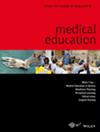Student engagement is influenced by several variables, among which are the teaching styles employed by faculty. In problem-based learning (PBL), the role of faculty is to facilitate the learning of the tutorial group as they work through clinical problems. However, the influence of tutor intervention styles and group process on engagement of students in PBL tutorials is unclear.
The study was conducted with year 2 and 3 medical students (n = 176) in PBL tutorial groups at the end of an integrated PBL course. Students evaluated their behavioural, cognitive and emotional engagement in PBL tutorials using a pre-validated 11-item questionnaire. Students also filled in a modified version of a previously published tutor intervention profile (TIP) questionnaire. The modified TIP questionnaire represents three constructs (1) steering the learning process (6 items), (2) stimulating student autonomy (4 items) and (3) establishing relatedness with students (3 items). In addition, PBL group process was evaluated using a 5-item nominal scale: (1) tutorial atmosphere, (2) listening and information sharing, (3) group performance, (4) decision making and (5) reaction to leadership.
Establishing sense of relatedness in the group by PBL tutors was the most important predictor of emotional engagement (F = 41.213, ΔR2 = 0.191, β = 0.438, P = 0.000). On the other hand, steering the learning process was a significant predictor of behavioural engagement (F = 19.0, ΔR2=0.098, β = 0.314, P = 0.000). However, stimulating student autonomy was not a significant predictor of student engagement in PBL tutorials. On the other hand, enhancing the group process in PBL tutorials significantly predicts student engagement with strong impact on emotional and cognitive engagement of students.
Establishing the sense of relatedness in the group and steering the learning process by PBL tutors as well as improving PBL group process are significant predictors of student engagement in PBL tutorials with emotional and cognitive engagement being the most sensitive variables affected.


